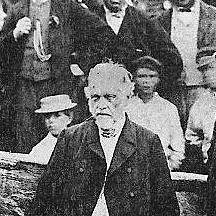Crawshay Bailey facts for kids
Quick facts for kids
Crawshay Bailey
|
|
|---|---|
 |
|
| Born | 1789 Great Wenham, Suffolk
|
| Died | 1872 |
| Occupation | Ironmaster |
| Political party | Conservative |
Crawshay Bailey (born in 1789 and died on January 9, 1872) was an important businessman from England. He became one of the most famous and successful iron-masters in Wales.
Contents
Early Life and Family
Crawshay Bailey was born in 1789 in a place called Great Wenham in Suffolk. His parents were John and Susannah Bailey. His family moved from Normanton around 1780. Crawshay was the youngest of six children born in Great Wenham.
His mother, Susannah, was the sister of Richard Crawshay. Richard was a very rich and famous ironmaster who owned the Cyfarthfa Castle ironworks near Merthyr Tydfil. When Crawshay was just twelve years old, in 1801, he went to work for his wealthy uncle. His older brother, Joseph, was already working there. In 1809, Crawshay was a witness to his uncle's will. He received £1,000 from his uncle, which was a lot of money back then.
Becoming an Iron Master
Crawshay Bailey's early career was often compared to his older brother, Joseph. Joseph later became known as Sir Joseph Bailey, 1st Baronet. When their uncle died in 1810, Joseph inherited a big part of the Cyfarthfa Works. Joseph had been the manager there.
Joseph Bailey later sold his share in Cyfarthfa. He teamed up with Matthew Wayne to buy the Nantyglo Ironworks. Crawshay joined his brother at Nant-y-glo. In 1820, after Wayne left, Crawshay became a full partner with his brother. Together, they also bought the Beaufort ironworks and several coal mines nearby.
For a while, Crawshay also managed the ironworks at Rhymney. While he was there, he built a special tramway. This was a type of railway used to move goods. It connected Rhymney to Bassaleg near Newport.
Crawshay Bailey and the Coal Business
Unlike many other iron masters, Crawshay Bailey saw a big future in the coal industry in South Wales. He was very smart and bought large areas of land that were rich in coal. He bought this land at its farming value, which was much cheaper. He waited for almost nine years before he started digging for coal. These lands later became some of the richest places for coal and iron ore in the world.
He also waited for the best time to start a railway company. In 1845, he helped create the Aberdare Railway. He worked with Sir John Josiah Guest on this project. This railway helped them use more of their land for new coal mines and iron furnaces.
He also supported building railways between Coleford in the Forest of Dean, and Pontypool. These railways went through Monmouth and Usk.
Soon after the Aberdare Railway was built, the Aberaman Ironworks opened. Many coal mines connected to it also started operating. Crawshay Bailey remained the owner of the Aberaman Estate. Even though his coal mines made good money, the iron business was not doing well. So, he decided to sell the Aberaman estate and move back to Monmouthshire. He sold the entire Aberaman estate, including the coal mines, ironworks, brickworks, and his private railway. He sold it to the Powell Duffryn Steam Coal Co. in 1867 for £123,500.
Crawshay Bailey was against trade unions. He did not want his workers to form groups to ask for better conditions or pay.
Political Life
Crawshay Bailey was also involved in politics. He was appointed High Sheriff of Brecknockshire in 1837. He also held the same important job in Monmouthshire in 1850.
He was a member of the Conservative political party. He served as a Member of Parliament (MP) for Monmouth Boroughs. He was elected five times in a row, serving from 1852 to 1868.
Later Years
By 1867, Crawshay Bailey owned many businesses. These included iron works, blast furnaces, coal mines, tramways, railways, and brickworks. He decided to retire in 1867. He spent the next three years selling all his businesses and properties. Before 1851, he had moved to Llanfoist near Abergavenny. He lived in a house called Llanfoist House. The local primary school in Llanfoist even has a house named after him.
He passed away in 1872 at the age of 83. He had worked in industry for at least seventy years. His only son and heir, Crawshay Bailey, Junior (born in 1841), inherited his wealth.
A priest named John Griffith, who was the rector of Merthyr, said this about Crawshay Bailey:
He was one of our greatest Iron Kings. He helped develop this country before any railway tracks were laid. Until the very end of his life, he worked hard to increase its manufacturing. From the time he joined his uncle at Cyfarthfa as a twelve-year-old boy, until he died at Llanfoist House as an old man of 84, he never left the iron country. He never stopped seeing its steam and smoke. No fancy homes, parks, or castles ever pulled him away from the dirt and smoke of the "Welsh Hills."
In Popular Culture
Crawshay Bailey is the original subject of a well-known folk song. The song is now often called Cosher Bailey.
Crawshay Bailey had an Engine
It was always needin' mendin'
And dependin' on its power
It could do four miles an hour
Did you ever saw
Did you ever saw
Did you ever saw
Such a funny thing before?
There are many different versions and verses to this song.
Crawshay Bailey is also mentioned by name in the song "Ironmasters." This song is on The Men They Couldn't Hang album called Night of a Thousand Candles.
 | Kyle Baker |
 | Joseph Yoakum |
 | Laura Wheeler Waring |
 | Henry Ossawa Tanner |

